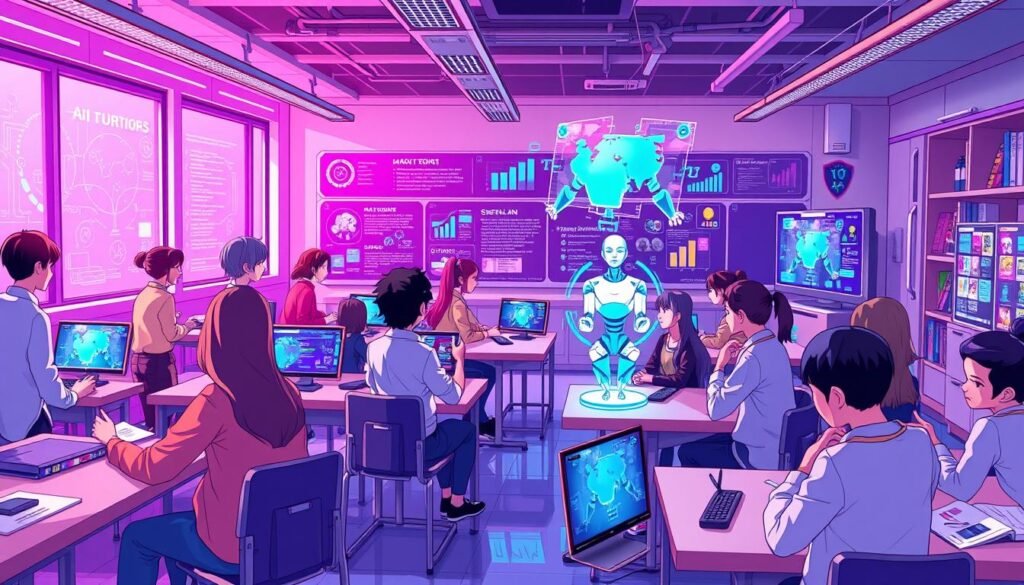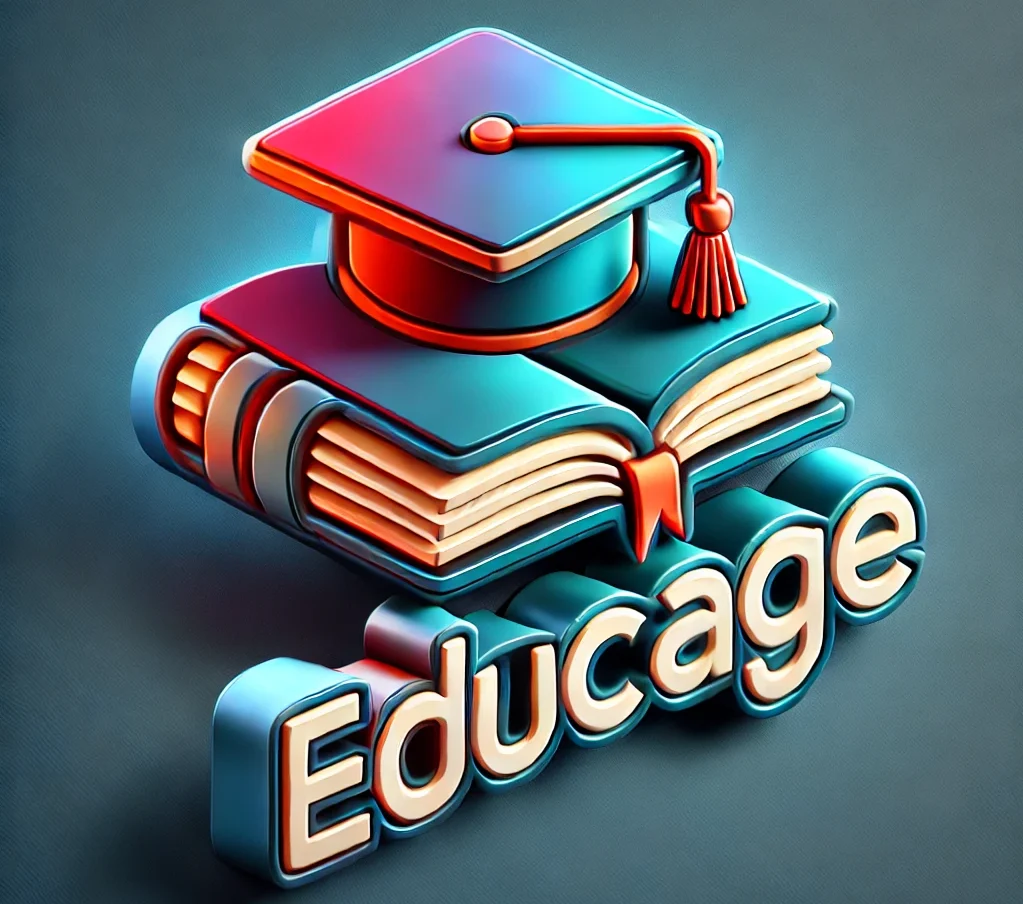Have you ever thought about how artificial intelligence is changing education? It’s making learning better and helping startups succeed like never before. AI is not just improving learning; it’s changing it.
AI tools are key for EdTech startups. Big names like Google, Microsoft, and IBM are leading the AI learning market, worth over $250 million1. Startups like Riiid and DreamBox Learning have also gotten big investments, showing AI’s bright future in education12.
AI does more than just help with paperwork. It makes learning personal, fitting each student’s needs. This tackles big problems in education. The EdTech market is set to grow to $341 billion by 20251. This shows how important AI is for better education.
Key Takeaways
- AI in EdTech startups is crucial for staying competitive in a rapidly growing market.
- Major corporations are investing heavily in AI-based education technologies.
- Successful startups are leveraging AI to enhance personalized learning experiences.
- Automation of administrative tasks through AI allows educators to focus more on teaching.
- Investment in AI-driven platforms presents both opportunities and challenges for startups.
Introduction to AI in Education Technology
Artificial intelligence (AI) is changing education technology. It makes learning better for students and teaching easier for teachers. AI helps create learning environments that adapt to each student’s needs.
Recent studies show that 60% of U.S. teachers, especially the younger ones, use AI tools. They help with daily tasks. Also, big platforms like Quizlet and Kahoot! are adding AI to their services3.
AI’s role in education is growing fast. It’s expected to reach $88.2 billion by 2032, growing 43.3% each year4. This growth means more personalized learning and better student-teacher interactions. AI also helps with administrative tasks and tackles ethical issues like data privacy5.
The Impact of AI on EdTech Startups
AI has changed the game for EdTech startups, making learning more personal. These companies use AI to adjust educational content for each student. This lets students learn at their own speed. They also get feedback right away, helping both teachers and students improve.
In September 2023, over 2,500 leaders worldwide shared how AI is being used in EdTech. They showed that AI tools are becoming more common in schools6.
Transformative Effects of AI on Learning
AI has a huge impact on how we learn. It makes learning better by improving how we teach and learn. Companies like Chegg and Quizlet are using AI to help students, showing how AI is becoming a big part of education7.
But, there are worries about relying too much on AI. It might make students less good at solving problems and thinking critically. Also, AI might not always get it right, as it can make general guesses about students7.
Market Trends and Future Predictions
The EdTech world is growing fast, with AI leading the way. The market is expected to hit USD 341 billion by 2025, thanks to AI. There are different ways to use AI, from making your own models to working with tech companies6.
This growth means schools need to figure out how to handle AI. They might need special roles like chief AI officers6. As we move forward, we must keep an eye on privacy, cost, and how students are treated.

Benefits of AI for EdTech Startups
Artificial Intelligence (AI) has changed education by offering tailored solutions for different learners. One big plus is the personalized learning path made possible by AI. Platforms like DreamBox Learning and Knewton adjust lessons to fit each student’s needs, making learning more engaging and successful. Studies show that 86% of teachers think AI makes learning more personal8.
Also, the market for personalized learning has grown a lot, taking over 43% of the education sector9.
Personalized Learning Experiences
AI systems look at how students learn and perform to make learning paths just for them. For example, Century Tech’s AI tutor can help students do up to 30% better8. Intelligent Tutoring Systems (ITS) also make learning more fun, increasing engagement by 20% and retention by 25% compared to regular classes8.
These changes help teachers give lessons that really fit each student’s needs.
Automation of Administrative Tasks
AI also helps with the boring stuff like grading and planning. Tools like Turnitin and Gradescope make these tasks easier for teachers. It’s known that 20 to 40% of a teacher’s work is just these tasks8.
By using AI, teachers can spend more time with students and improving lessons. As more schools want automated grading, AI is changing how we manage and teach courses9.
| AIs Impact | Statistics |
|---|---|
| Personalization in Learning | 86% of educators believe AI enhances personalization8 |
| Improvement in Performance | AI tutors can improve performance by 30%8 |
| Teachers’ Workload Reduction | 20-40% of workload involves administration tasks8 |
| Market Share for Personalized Learning | 43% of the education sector’s share9 |
AI Applications in Educational Technology
AI is changing how we learn, thanks to adaptive learning systems and intelligent tutoring systems. These tools use machine learning to make learning personal for each student.
Adaptive Learning Systems
Adaptive learning systems adjust lessons based on how well students do. This means each student gets a learning path that fits them best. Knewton and Squirrel AI are great examples of this.
These systems make learning more fun and help teachers teach in ways that work for everyone. AI is helping over 2.5 million teachers use cool tools like quiz makers and text summarizers. This shows how AI is becoming a big part of teaching10.
Intelligent Tutoring Systems
Intelligent tutoring systems take personalization to the next level. They use AI to give students the right help and feedback. Riiid and Memrise are examples of how well this works.
A 2020 study found that teachers could save up to 13 hours a week with these tools. This shows how AI can make teaching easier10. Education departments in places like South Korea and the US are really getting into using AI in schools.
But, some teachers are still unsure about AI’s role in grading and planning lessons10. Still, the mix of AI and tutoring systems is making learning more effective and fun.

Leading EdTech Startups Leveraging AI
Many edtech companies are using AI to change education. Duolingo and DreamBox Learning use AI to make learning better for students. Their work is changing how we learn all over the world.
Examples of Successful AI-Driven Companies
Here are some top names in AI education:
- Duolingo: Uses AI for learning languages, making it fun and effective.
- DreamBox Learning: Works in the USA and Canada, winning over 40 tech awards.
- Squirrel AI: Worth $1 billion, it helps over 60,000 schools in Asia11.
- Riid: This South Korean company grew fast, getting 1 million users and $247 million in funding12.
- Sana Labs: Known for making learning personal, it’s valued at $250 million12.
Innovative Uses of AI in Educational Startups
AI is being used in many new ways in education:
AI helps keep students interested and successful with tools like chatbots and predictive analytics.
Edsoma makes reading fit each student’s needs. Kiddom combines classroom tools with AI for better feedback. These efforts show the $1.5 billion investment in AI education13.
AI-Driven EdTech Advancements
In the world of education, AI is changing how we learn. It has brought in new tools like automated grading and content creation. These tools make learning better. Today, most educators see AI as a positive force in education, with 97% believing it helps14.
But, only 35% of schools are using AI yet. This shows a need for more use of these new tools14. AI helps with learning that fits each student, and it saves teachers time on paperwork14. Even though most educators think AI is good, only 56% use it14.
Companies like Squirrel AI are showing how AI can change education for the better. They help over 24 million students. The EdTech market is growing fast, showing AI’s big role in education15.

| Advancement | Description | Impact |
|---|---|---|
| Automated Grading | AI algorithms evaluate student assignments, providing instant feedback. | Reduces educators’ administrative burden and increases efficiency. |
| Generative Content Creation | AI creates learning materials tailored to student needs. | Enhances personalized learning experiences. |
| Data Analytics | Utilization of student data to optimize learning paths. | Improves student engagement and outcomes. |
| Virtual Tutors | AI-powered tutoring systems provide support outside classroom hours. | Facilitates 24/7 learning opportunities. |
AI is making education better and changing how we see learning today. But, there are challenges like training teachers and keeping data safe. Schools must adapt to these new tools carefully.
Challenges of Integrating AI in EdTech
Adding AI to educational tech comes with many challenges. One big issue is the high cost of AI setup. This can be too expensive for many schools, especially public ones with tight budgets16. With the EdTech market expected to hit $404 billion by 2025, more people want to invest in new tech17.
Cost of Implementation
The high cost of AI can stop many startups from using it. Schools often can’t afford new tech because of their tight budgets. Finding other ways to fund AI, like grants or partnerships, is key to overcoming these financial hurdles.
It’s important to plan carefully and work with investors to get the funds needed. This way, startups can develop their AI products without breaking the bank.
Privacy and Data Security Concerns
Privacy and data security are big worries when using AI in schools. The State of EdTech Privacy Report shows many educational products lack clear privacy and security info16. AI collects and uses personal data, so it’s vital for EdTech companies to handle this data ethically.
Schools might be hesitant to use AI because of concerns about data breaches and misuse. By focusing on strong security and clear privacy policies, EdTech companies can build trust and follow the law.
How EdTech Companies Can Leverage AI for Success
EdTech companies have a big chance to use AI to improve education. They can make AI solutions that meet different student needs. It’s key to use AI well to make learning better and more fun.
Creating Scalable AI Solutions
To make AI solutions that grow, EdTech companies need to focus on customization. They should use new tech to help teachers by doing tasks like grading. This lets teachers teach more.
The AI in education market is growing fast. It was worth $2.5 billion in 2022 and is expected to hit $3.68 billion by 202318. Using Intelligent Tutoring Systems and adaptive learning is becoming more common. It helps meet each student’s needs18.
Enhancing Engagement and Retention
Keeping students interested is key for EdTech companies. AI can help make learning more engaging and keep students interested. Studies show that 77% of teachers think XR can make learning more fun19.
AI chatbots can also help by offering support outside class. This lets students learn anytime, anywhere18.

Working with local groups can also help. For example, 56% of 10-year-olds in Latin America struggle with reading19. It’s important to check AI content to make sure it’s right and fair. This helps students learn better19.
By using new AI ideas, EdTech companies can change how we learn. They can make sure every student gets the help they need to succeed.
Machine Learning in Educational Startups
Machine learning is key for educational startups. It changes how we learn from content. Startups use data to make learning fit each person’s needs. This way, learning can happen at the learner’s own pace and style.
Machine learning helps create tools that give feedback right away. These tools make learning more fun and personal. For example, Bamboo Learning uses AWS to keep learning apps running smoothly. This helps kids improve their listening and reading skills20.
The future of AI in education looks bright. It could grow to $90 billion by 202521. Startups using AI are getting a lot of money. They’re making learning more personal, which is good for everyone22.
| Startup | Key Innovations | Impact |
|---|---|---|
| Bamboo Learning | Alexa skills | Helps children grow their listening, speaking, and reading skills20. |
| Cognifit | Cognitive skill assessments | Assessed 23 fundamental skills, aiding over 24,000 students per month20. |
| Xingzhe AI | AI programming training | Assisted over 10,000 students globally in AI mastery20. |
| Lalia | Personalized learning | Engaged more than 60 schools in Japan to tailor vocabulary and grammar learning20. |
| AWS EdStart | Startup accelerator | Supports innovations in online learning and analytics20. |
Machine learning is making education better. It helps solve big problems in learning. We need to work with teachers to make sure it really helps students learn.
The Role of EdTech Companies in Advancing AI
EdTech companies are at the forefront of using AI in education. They face big challenges like bias and fairness in AI. It’s important to make AI fair and open for everyone.
By focusing on ethics, EdTech can make AI better for schools. This means making sure AI helps all students and teachers. It’s all about creating a positive learning space for everyone.
For more on this, check out how AI can help in education.
Ethical Considerations in AI Development
EdTech companies must handle the ethics of AI in education carefully. They need to manage costs, keep learning human, and protect privacy. They also need to use data to help students learn better.
With23 seven AI tools changing learning, it’s key to make sure they work well together. They should help students learn together and at their own pace. If not, AI might not work as well as hoped.
Collaborative Efforts with Educators
AI works best when EdTech teams up with teachers. Teachers help make sure AI tools fit the classroom. This teamwork can make teaching better and bring new ideas to learning.
For example, Anthology’s Blackboard Learning System shows how AI can help students succeed. The education market is growing fast, expected to hit $88.2 billion by 203224. Teachers will play a big role in making AI tools that work for all classrooms.

Future of EdTech with AI Integration
AI is changing education technology in big ways. It’s making learning more personal. AI helps teachers tailor lessons to each student’s needs, making learning more fun and effective25.
In 2024, 67% of EdTech startups will use AI in their products. This shows a big push for new ideas in education26. AI can adjust lessons to fit each student’s pace, making sure everyone keeps up25.
AI also helps with tutoring, offering one-on-one support like a human teacher. It makes learning better and keeps classrooms safe from bullying25.
More money is going into AI in education. Companies like Knewton are getting funding to improve learning. Startups like Luca.ai are tackling dyslexia with AI, showing the trend of support for AI in schools26.
AI can create learning plans that change as students progress. This makes learning more effective by using data in real-time25. It also helps make learning accessible and safe for everyone25.
| Statistics | Impact |
|---|---|
| 67% of EdTech startups integrating AI by 202426 | Indicates a significant shift towards smart learning solutions. |
| AI-driven tutoring systems enhance personalized learning25 | Fosters individual growth, similar to human tutors. |
| Dynamic curriculums adapt to students’ needs25 | Improves learning efficacy and student engagement. |
AI in EdTech Startups: Case Studies
AI has changed education in big ways, leading to many success stories in edtech. DreamBox Learning and Carnegie Learning show how AI can make learning more personal. They use smart learning tools that make education fun and help students remember more.
The AI in Education Market size hit USD 4 billion in 2022. It’s expected to grow over 10% each year from 2023 to 203227.

Success Stories from the Latest Innovations
Startups like Memrise and Osmo are making learning fun with AI. Memrise, from the UK, has over 50 million users. This shows how AI can draw people in28.
Osmo focuses on games for kids and is used in over 31,000 classrooms. This shows AI can really help in education28.
Lessons Learned from AI Implementations
Edtech startups have learned a lot about using AI. They found that being flexible and getting feedback is key. It’s also important to keep student data safe, especially with AI chatbots.
Tools like Chat GPT help students and teachers a lot. But, we need to watch out for biases and not overuse them2728.
The Scope of AI-Driven Platforms in Education
The scope of AI in education technology is growing fast. This is thanks to AI-driven educational platforms that offer personalized learning. These platforms use adaptive learning to understand students’ strengths and weaknesses. They adjust the content to fit each student’s needs well.
For example, tools like Knewton’s Alta have shown big improvements in student results. This is because they use customized learning paths29.
Also, automated grading systems like Gradescope save teachers a lot of time. They can focus more on teaching instead of grading29. New tools, like AI lesson plan generators, are also helping teachers. They save about 15 minutes per lesson and make sure the content fits local curricula30.
AI’s impact in education goes beyond the classroom. It also shapes career paths. New roles, like Learning Experience Designers and Community Builders for Learners, show how education is changing29. Big names like Google, Microsoft, and IBM are investing heavily in this area. Together, they control over $250 million of the market1.
The global EdTech market is set to hit USD 341 billion by 2025. This opens up many chances for startups in adaptive learning and AI1. But, there are still hurdles. Issues like AI biases and limited access in remote areas need to be addressed30. So, it’s crucial to have a solid business plan that also respects ethics.
Transformative Technologies in Education
Transformative technologies in education are changing how we learn today. AI and tech are not just making learning better; they’re changing it. Virtual and augmented reality are making learning fun and deep. They help teachers create learning spaces that fit different learning styles.
Technology’s role in learning has grown a lot. The EdTech market, driven by AI, is expected to hit $535 billion by 203031. The AI education market is set to grow by 45% annually, reaching $6 billion by 202532. This shows we need tools that learn with us, like AI in language learning apps.
A 2021 study found that AI in learning games boosts student interest and effort31. 79% of EdTech folks think AI will make learning better, showing its power31. AI also helps teachers by saving them 20-30% of their time32.
Looking into these technologies, we see how they work with AI to improve learning. AI tools can help students remember things better and learn more, by up to 27% and 25%32. These technologies are making education more exciting for the future.

| Technology | Impact |
|---|---|
| Virtual Reality | Creates immersive learning experiences, increasing student engagement |
| Augmented Reality | Enhances real-world learning through interactive content |
| AI in Administrative Tasks | Saves educators 20-30% of their time with streamlined workflows |
| Personalized Learning Tools | Adapts to individual student backgrounds and styles |
Conclusion
The success of AI in EdTech startups is more than just a trend. It’s changing the way we learn. The global EdTech market was worth $89.49 billion in 2020. It’s expected to grow by 19.9% every year until 2028. This growth is thanks to new learning technologies and AI tutoring systems like those from Squirrel AI and Carnegie Learning3334.
AI can make learning more personal. This could help students do better in school. It also helps make education fairer for everyone, no matter their background34. Looking ahead, AI will make learning more fun and keep students interested for longer35.
This summary shows how new tech is helping in education. It lets teachers, students, and schools work better together. By using these new tools, you and your school can do great things in a digital world that values personal learning paths3334.
